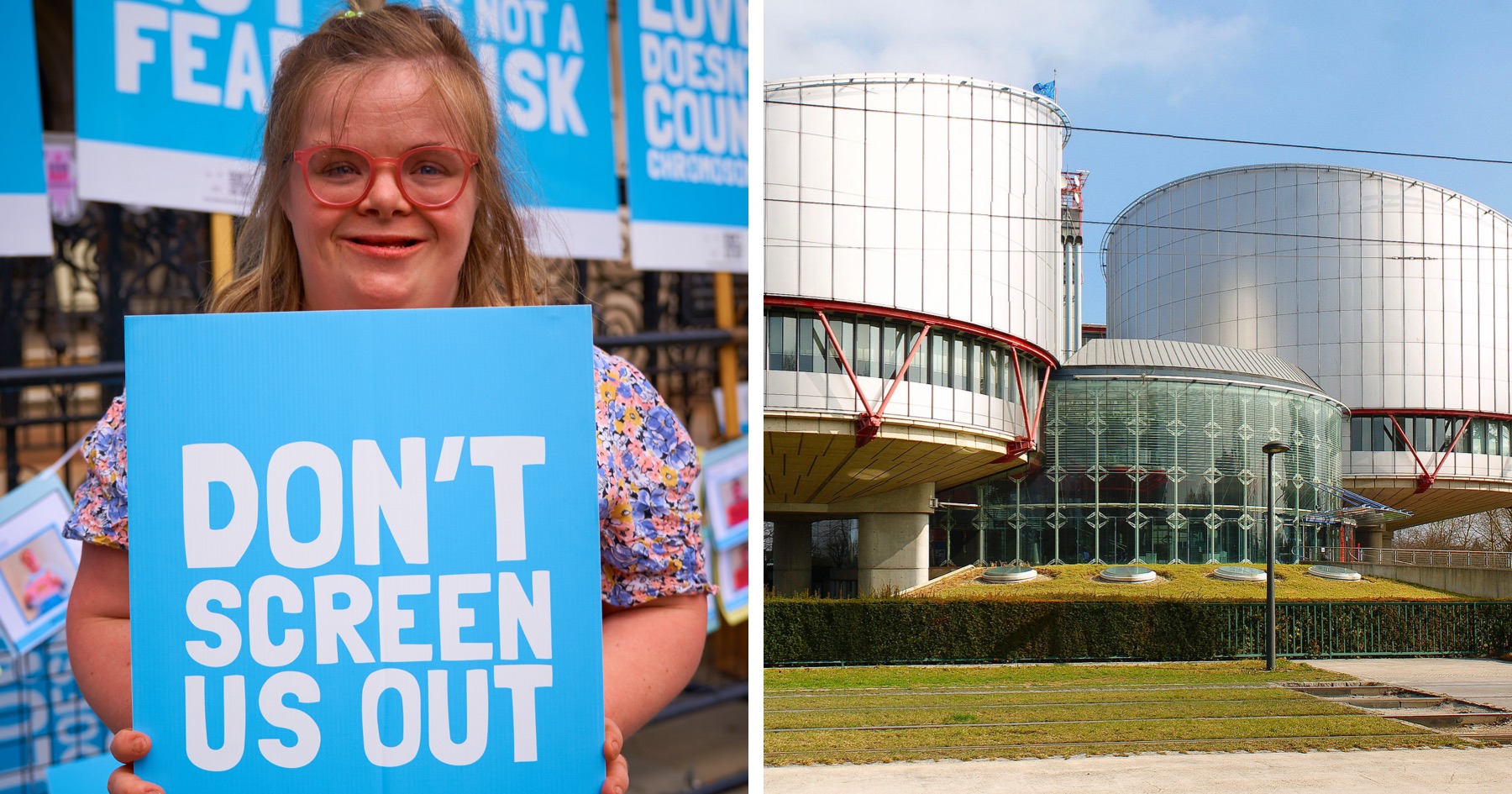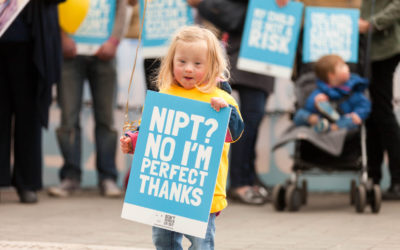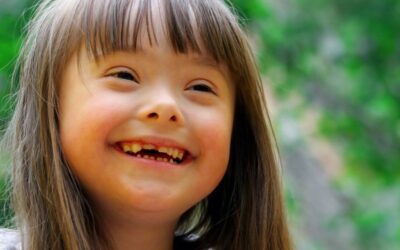Press release for immediate release
Woman with Down’s syndrome to take landmark case against UK Govt over discriminatory abortion law to European Court of Human Rights
A woman with Down’s syndrome has announced that she will be taking her landmark case against the current discriminatory abortion law, which allows abortion up to birth for Down’s syndrome, to the European Court of Human Rights.
The European Court of Human Rights could find the UK’s current disability abortion law to be in violation of human rights, which could not only have implications for the United Kingdom but also set a legal precedent for all forty six countries that are members of the Council of Europe. The countries have a total combined population of over 700 million people.
Heidi Crowter, a 27-year-old woman from Coventry who has Down’s syndrome is challenging the UK Government over a disability clause in the current law. She is a self-advocate who has publicly campaigned for the last six years for equal treatment for those with Down’s syndrome in all areas of life. Her case has been heard in the High Court and Court of Appeal and she will now take it on to the European Court of Human Rights.
Heidi has been joined in her fight for justice by Máire Lea-Wilson from Brentford, West London, whose three-year-old son Aidan has Down’s syndrome. Máire Lea-Wilson was placed under pressure to have an abortion when a 34-week scan revealed her son had Down’s syndrome. There has been widespread coverage of Heidi and Máire’s case across major media outlets.
BACKGROUND
Currently in England, Wales and Scotland, there is a general 24-week time limit for abortion, but if the baby has a disability, including Down’s syndrome, cleft lip and club foot, abortion is legal right up to birth.
There were 3,370 disability-selective abortions in 2021, a 9% increase from 3,083 in 2020. The number of late-term abortions at 24 weeks gestation or over where the baby has a disability increased by 20% from 229 to 274.
The statistics showed there were 859 abortions where a baby had Down’s syndrome in 2021, an increase of 24% from 2020. The statistics also show a 71% increase in late-term abortions at 24 weeks gestation or over where the baby had Down’s syndrome, increasing from 14 in 2020 to 24 in 2021.
The UN Committee on the Rights of Persons with Disabilities has consistently criticised countries that provide for abortion on the basis of disability.
The Committee on the Rights of Persons with Disabilities’ concluding observations on the initial report of the United Kingdom of Great Britain and Northern Ireland made a key recommendation that the UK change its abortion law so that it does not single out babies with disabilities. The Government has decided to ignore this recommendation.
The Disability Rights Commission (now the Equality and Human Rights Commission) has said that this aspect of the Abortion Act “is offensive to many people; it reinforces negative stereotypes of disability…[and] is incompatible with valuing disability and non-disability equally”.
The 2013 Parliamentary Inquiry into Abortion for Disability found the vast majority of those who gave evidence believed allowing abortion up to birth on the grounds of disability is discriminatory, contrary to the spirit of the Equality Act 2010 and that it affects wider public attitudes towards discrimination. The Inquiry recommended Parliament review the question of allowing abortion on the grounds of disability and should consider repealing section 1(1)(d) of the Abortion Act which allows for it.
Disabled peer Lord Shinkwin proposed a Bill in the House of Lords that would have repealed section 1(1)(d) of the Abortion Act – the Bill was undefeated but unfortunately ran out of time. The Bill was supported by Disability Rights UK.
Polling has shown that the majority of people in England, Wales and Scotland feel that disability should not be grounds for abortion at all, with only one in three people thinking it is acceptable to ban abortion for gender or race but allow it for disability.
Heidi and her legal team have set up a CrowdJustice crowdfunding page to help raise funds for legal proceedings, pay for legal advice and prepare for the case. To find out more and to make a contribution to the case visit:www.crowdjustice.com/case/downrightdiscrimination/
Heidi Crowter, from Coventry, who has Down’s syndrome said:
“I am taking my case all the way to the European Court of Human Rights at Strasbourg because it is downright discrimination that people with disabilities are treated differently.
In 2023, we live in a society where disabled people are valued equally after birth but not in the womb.
Our law singles out babies with disabilities. It says that babies can’t be aborted after 24-weeks if they are not found to have a disability, but if a baby is found to have Down’s syndrome, they can be aborted up until birth. This is the current law in the UK and I think it’s not fair.
This law sends a message to people like me with Down’s syndrome that we are less valuable than others. This is not true and it is not right.
The United Nations Committee on the Rights of Persons with Disabilities recently said that the United Kingdom should change its abortion law to make sure that people like me aren’t singled out because of our disabilities but the Government hasn’t changed the law.
So me and other members of the Down’s syndrome community have set out to get rid of the clause in the law, and now we are taking our case to the European Court of Human Rights.
I have a great life. I want every baby with Down’s syndrome to have the same chance to live and enjoy their life.
I hope we win. People shouldn’t be treated differently because of their disabilities, it’s downright discrimination.”
Lynn Murray, spokesperson for Don’t Screen Us Out and mother of Rachel who has Down’s syndrome, said:
“It’s inspiring to see that Heidi is now going to be taking her landmark case all the way to the European Court of Human Rights at Strasbourg.
As a mother of a 23-year-old daughter who has Down’s syndrome, I see every day the unique value she brings to our family and the positive impact she has on others around her.
By stating that disability is grounds for termination, section 1(1)(d) of the Abortion Act, promotes inequality and perpetuates negative stereotypes. This law sends a message that people with disabilities are less worthy of life and protection than others.
The provision in the Abortion Act harks back to a time when we thought it was better for people with disabilities not to be part of our society. We live in a far more inclusive and progressive society now, where we celebrate diversity, and all of our laws should reflect that.”
ENDS
- For more information on the Don’t Screen Us Out campaign, see our website www.dontscreenusout.org or email info@dontscreenusout.org
- For interviews, contact Don’t Screen Us Out spokesperson Lynn Murray on 0784 0966 736 or email info@dontscreenusout.org
- Photos and videos of Heidi and other people with Down’s syndrome holding rallies to support the case that are available to be freely used by media are here:
- Heidi’s Facebook page:
- Previous news coverage featuring Heidi Crowter:
- Recordings of media interviews on the BBC, ITV, Sky etc are available here: https://youtube.com/playlist?list=PLG6Sw7kMnaLXUop-qCQP72ZEMLZ6YghZY
- Telegraph – https://www.telegraph.co.uk/news/2020/10/18/woman-downs-syndrome-says-better-dead-eyes-law-ahead-legal-challenge/
- Sky News – https://www.youtube.com/watch?v=Qz0pU7TKqb0
- https://www.dailymail.co.uk/news/article-8351603/Woman-Downs-Syndrome-launches-legal-bid-end-abortion-discrimination.html
- BBC Victoria Derbyshire Show – https://www.youtube.com/watch?v=eeNuWj3xhbM
- Channel 5 News – https://www.youtube.com/watch?v=eeNuWj3xhbM
- https://www.theguardian.com/society/2018/dec/03/my-life-is-just-as-important-as-everybody-elses-meet-the-disability-leaders
- https://www.bbc.co.uk/news/av/45790521/the-23-year-old-busting-myths-about-down-s-syndrome
- ITV News – https://www.itv.com/news/central/2019-03-21/he-makes-me-the-happiest-girl-in-the-world-twenty-three-year-old-with-downs-on-her-love-life-and-work-wouldntchangeathing-downs-syndrome-world-downs-syndrome-day/
- Huffington Post – https://www.huffingtonpost.co.uk/entry/having-downs-syndrome-doesnt-make-me-less-of-a-person_uk
- Daily Mail – https://www.dailymail.co.uk/video/news/video-1318649/Heidi-Crowter-s-powerful-s-Syndrome-message-Jeremy-Hunt.html



